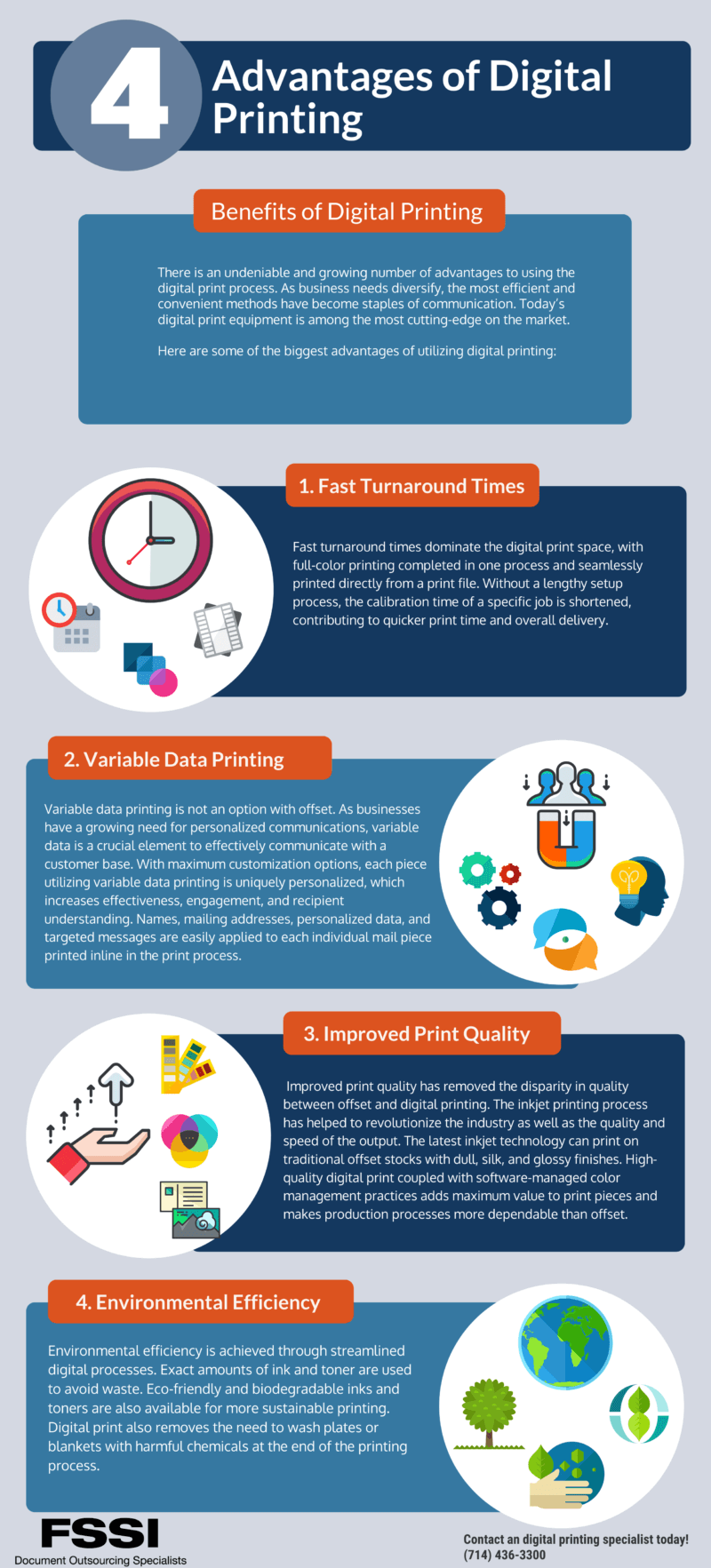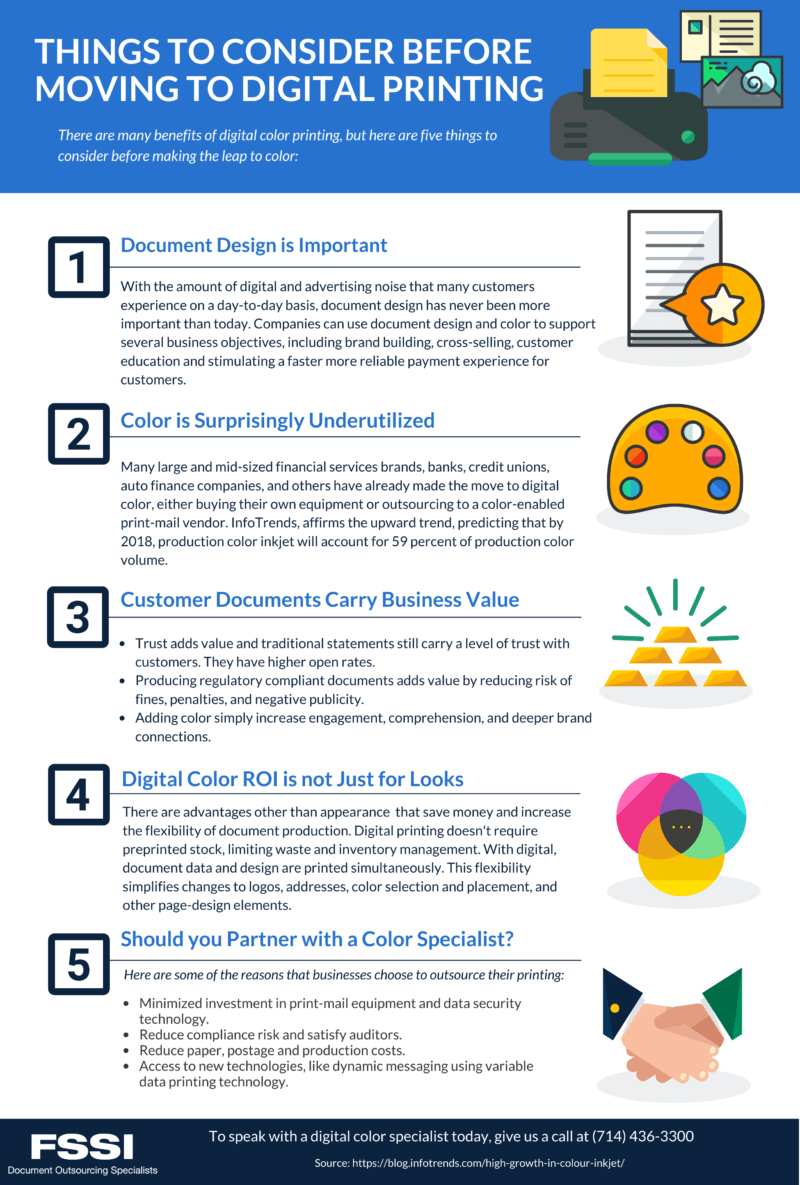Digital Printing Fundamentals Explained
Table of ContentsNot known Details About Digital Printing Digital Printing for DummiesDigital Printing - TruthsThe 25-Second Trick For Digital PrintingSome Ideas on Digital Printing You Need To KnowDigital Printing Can Be Fun For Anyone
Variable data printing, such as direct mail with personalized codes and addresses, is preferably fit for digital printing. Digital fast printing only requires four actions of layout, testimonial, printing and binding to get whatever done. Digital quick printing has an exceptional benefit: print on need.According to PMMI, electronic printing allows brand names and makers to respond rapidly to consumer demands while boosting the supply chain, lowering warehousing cost and waste, and appreciating faster time to market. That all noises excellent, yet how does this innovation do all that? The major differentiator of these innovations is that there are no set up fees and no plates with electronic printing.
Some Known Questions About Digital Printing.
This results in quicker turnaround time and decreases price when utilizing electronic printing.
Digital printing is highly versatile, so it's easy to make modifications to the bundle style quickly. It all goes back to the plates.
With conventional printing approaches, short-run printing is simply not possible. Since a great layout can make or break your item, electronic printing continually creates premium, clear and vivid graphics each time.
Digital printing is the procedure of printing digital-based photos straight onto a variety of media substrates. There is no requirement for a printing plate, unlike with balanced out printing. Digital data such as PDFs or desktop publishing data can be sent directly to the digital printing machine to print on paper, photo paper, canvas, textile, synthetics, cardstock and other substratums.
Some Known Details About Digital Printing
According to PMMI, electronic printing enables brands and manufacturers to react rapidly to consumer demands while enhancing the supply chain, decreasing warehousing expense and waste, and appreciating faster time to market. That all audios excellent, but how does this innovation do all that? The major differentiator of these modern technologies is that there are no set up fees and no plates with electronic printing.
According to Wikipedia, the best difference in between digital printing and standard methods such as lithography, flexography, gravure, or letterpress is that there is no demand to replace printing plates in electronic printing, whereas in these analog printing techniques the plates are consistently replaced. This results in quicker turn-around time and reduces cost when making use of digital printing.

Little Known Questions About Digital Printing.
More supply can imply even more waste later on. click to find out more With traditional printing methods, short-run printing is just not possible. Due to the fact that a fantastic style can make or break your product, digital printing constantly develops high-quality, clear and vibrant graphics each time. Digital printing on flexible bags includes the bright, dynamic, and specific graphics that practically bid customers to reach out and touch them.

According to PMMI, digital printing enables brand names and producers to respond promptly to customer needs while improving the supply chain, minimizing warehousing price and waste, and delighting in faster time to market. That all sounds wonderful, yet just how does this technology do all that? The major differentiator of these innovations website here is that there are no set up fees and no plates with digital printing.
Digital Printing Fundamentals Explained
According to Wikipedia, the greatest difference between electronic printing and traditional techniques such as lithography, flexography, gravure, or letterpress is that there is no demand to change printing plates in electronic printing, whereas in these analog printing techniques home plates are repetitively replaced. This causes quicker turnaround time and lowers cost when using digital printing.
Speedy manufacturing indicates getting your product to market much faster. It also means it's simpler and faster to make adjustments later on, when you alter a dish, add a SKU, or develop seasonal packaging. Digital printing is highly adaptable, so it's very easy to make adjustments to the plan design swiftly. All of it returns to the plates.

Indicators on Digital Printing You Should Know
Digital printing is the process of printing digital-based images directly onto a range of media substrates. There is no need for a printing plate, unlike with countered printing. Digital data such as PDFs or desktop posting data can be sent out directly to the digital printing press to publish theoretically, picture paper, canvas, textile, synthetics, cardstock and other substratums.
Comments on “The Ultimate Guide To Digital Printing”